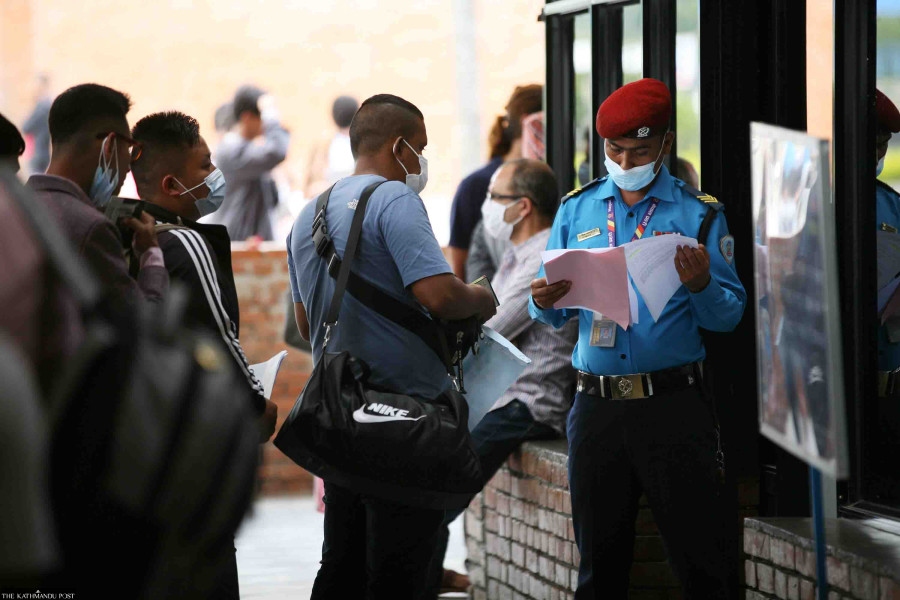Money
Nepal removes fixed-term labour approvals
Nepali missions in destination countries have been given the authority to issue re-entry labour approvals.
Pawan Pandey
The government has decided to issue labour approvals for foreign employment for the period of contract workers sign with their employers.
Currently, a Nepali migrant worker receives labour approval for two-year.
The government has also given the Nepali missions in destination countries the authority to issue re-entry labour approvals, according to the labour ministry.
Until now, the Department of Foreign Employment has been issuing re-entry labour approvals.
Ek Narayan Aryal, secretary at the Ministry of Labour, Employment and Social Security, said that workers had to face various hassles because of the existing provisions.
“The new provision is for those workers who go to foreign destinations such as Malaysia with a three or four-year employment contract,” said Aryal. “While they won’t have to return home to renew their labour approvals after two years from now on, they will remain documented and be eligible for various compensation schemes.”
“We have been trying to make the process more flexible and bring more reforms in the labour migration sector,” Aryal added.
A majority of workers who go abroad with a two-year labour approval stay on and continue to work for the same employer even if their work permit expires and the initial contract period with the employer is over. Such practice results in a large number of workers overstaying their permits.
Overstaying workers are not included in the government’s compensation scheme. Migrant workers, who overstayed abroad, and their families, are not considered eligible to receive various financial support provided by the government if the worker suffers from loss of life, injury or illness.
However, this is not the first time the government has said workers would be able to renew their labour permits in destination countries.
The Department of Foreign Employment, the government agency which oversees labour migrations, had told the Post in December 2020 that re-entry permits could be received anywhere in the world and all applications for work permits would be handled online. But, it was never implemented.
Kabiraj Upreti, deputy spokesperson at the Labour Ministry, said the issues in the payment system for insurance and Migrant Workers’ Welfare Fund had affected its implementation.
“We plan to write to the Nepali missions abroad that they will be authorised to make the payment for the Migrant Workers Welfare Fund,” said Upreti.
A worker has to deposit Rs1,500 in the fund before he goes abroad for a foreign job with a two-year labour approval and has to deposit Rs2,500 for a longer period of approval.
“It might take some days for the missions to make preparations for the implementation of this decision,” said Upreti.
Meena Poudel, a migration researcher, said a lack of coordination between the foreign and labour ministries was also the reason behind the non-execution of the government’s decision.
Labour migration experts said the government’s decision is a positive one and will benefit workers.
“Since the government has established a labour desk in destination countries of late, there are more chances of the new provision going into effect,” said Poudel. “If implemented properly, it will be beneficial for the workers.”
However, the authorities need to monitor how effectively the officials at the labour desk will be able to perform the task for the benefit of workers and ensure that the middlemen are not able to interfere with it.
“Nepal issuing a labour approval for foreign-bound workers is in itself a strange provision since it is something a destination country is supposed to give,” said Jeevan Baniya, assistant director at the Centre for Study of Labour and Mobility, Social Science Baha, a research institution. “However, the provision for the renewal of labour permits through diplomatic missions seems more implementable this time.”
“If it comes into effect, it will guarantee the long-term employment of workers as they do not have to return home for renewing labour approvals and would save them the travel expenses while ensuring their legal stay in the destination countries,” Baniya added.
According to labour ministry officials, the current provision is not applicable for seasonal jobs.
The government in December last year brought a guideline for sending seasonal workers, who can work abroad for three months to 1 year.
The guidelines envision sending individuals for seasonal work under a 'zero cost' scheme through a government initiative.
Local governments have been given the authority to select and recruit workers. They will make their own guidelines to carry out the recruitment process.
“A country-specific decision needs to be made regarding the seasonal workers,” said Aryal, the labour secretary.




 21.12°C Kathmandu
21.12°C Kathmandu













